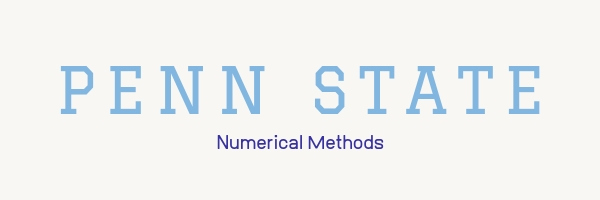
Return to Ken Judd’s Home Page
Return to Ken Judd’s Penn State Numerical Methods Course Home Page
PENN STATE 2018 – NUMERICAL METHODS BY KEN JUDD
1: Dynamic Programming
The first files below are my lecture notes.
The 2014 Handbook paper is a general reference that I will follow in my presentations.
The 2010, 2012, and 2013 papers focus on some basic issues related to stable value function iteration.
The 2015 paper is an application of a large-scale DP software suite.
- 0__DP_Continuous_States.pdf
- 1_1 Stable VFI example.nb.pdf
- 1_2 Unstable VFI example.nb.pdf
- 1_3 VFI with state constraints-lecture.nb.pdf
- 1_4 VFI with state and shape constraints.nb.pdf
- 1_5 VFI verification.nb.pdf
- 2000 Solving a Savings Allocation-Problem by Numerical Dynamic Programming.pdf
- 2010 Stable and Efficient Computational Methods for Dynamic Programming.pdf
- 2011 Solving the Multi-Country Real Business Cycle Model.pdf
- 2012 Dynamic Programming With Shape-Preserving Rational Spline-Hermite Interpolation Economics-Letters.pdf
- 2013 Shape-Preserving Dynamic Programming.pdf
- 2014 Chapter-8-Advances-in-Numerical-Dynamic-Programming-and-New-Applications_Handbook-of-Computational-Economics.pdf
- 2015 Stochastic Integrated Assessment of Climate Tipping Points.pdf
2: Projection Methods
My projection methods lecture will begin with my 1992 paper. The 1997 paper looks at larger models. The 2011 paper outlines a simple iterative method that often works.
I include two lecture notes on two basic examples.
- 1992 Projection Methods For Solving Aggregate Growth Models.pdf
- 1996 Approximation, Perturbation, and Projection Methods In Economic Analysis.pdf
- 1997 Solving Large-Scale Rational-Expectations Models.pdf
- 2002 The Parametric Path Method an Alternative to Fair-Taylor and L-B-J.pdf
- 2010 Computational Suite of Models with Heterogeneous Agents.pdf
- 2011 Numerically stable and accurate stochastic simulation.pdf
- Basic Example with Elastic Labor Supply.nb.pdf
- Basic Example with Fixed Labor Supply.nb.pdf
3: Solving Polynomial Systems
The papers below cover the mathematical background along with some economic examples.
My presentation will be light on the math and give examples of applications to economics. In particular, I will describe a general way to solve two-period dynamic games.
- 1 Closed form solutions.nb.pdf
- 2 Triangular Systems.nb.pdf
- 2012 Judd_et_al-2012-Quantitative_Economics.pdf
- 3 Groebner bases.nb.pdf
- 4 Hidden Polynomials.nb.pdf
- 5 Polynomial Optimization.nb.pdf
- 6 Monopoly with capacity constraint.nb.pdf
- 7 Two players example.nb.pdf
- Chapter-11-Computing-All-Solutions-to-Polynomial-Equations-in-Economics_2014_Handbook-of-Computational-Economics.pdf
- GroebnerBases ICE July 27 2010_001.pdf
- Kubler Schmedders OR2010.pdf
nICE2018
Location and Date
Hoover Institution, Stanford CA
July 30 — August 10
Speakers and Topics
- Todd Munson (Argonne National Labs) Optimization, nonlinear complementarity problems
- Ken Judd (Hoover) Approximation, quadrature, dynamic programming, games, projection methods
- Simon Scheidegger (UZH) (tentative) Parallel computing
- Yongyang Cai (Ohio State) NLCEQ method
- TJ Canaan (U. Minnesota) Polynomial systems of equations
- Carlos Rangel (Penn State) Multiobjective optimization
- Ben Skrainka (tentative) Software engineering
Student Activities
Students will be required to write programs related to lecture topics. They can choose from a large list of posted problems, and can use any language they want. (By the way, Excel and Stata are NOT programming langages.) The list of possible tasks will include replication of published papers and evaluation of alternative software. Our goal is to give the students experience with serious programming challenges with help from the speakers.
The goal is to identify important basic computational tasks, write reliable code for or evaluate existing code for those tasks, and then post them for public use. Some projects will involve novel methods for solving economic problems, and may lead to publishable papers. The end result will hopefully be a collection of programs and results that the students will find useful in their research.
Student Presentations
In the first week, there will be a poster session where students can present research they are working on.
In the second week, there will be be opportunities for students to present their code.
Logistics
I recommend Airbnb. I may have some dorm rooms for nICE participants but won’t know for a while. I will have past visitors tell you about the range of options for staying near Hoover.
There is a good bicycle rental place on campus that everyone uses.
Rumor has it that there are good places for hiking, surfing, wind surfing, lying on the beach, etc., nearby.